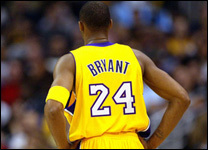Jack McCallum writes in his column for Sports Illustrated that NBA fans make questionable choices when choosing the starters for the NBA’s All-Star Game. This has long been an argument from sportswriters, the so-called “experts” of the game. I think the first so-called controversy over fan-balloting that I remember was when A.C. Green was chosen over Karl Malone to start for the West in 1990. Malone was outraged and so were the writers. Even though Green was a valuable role player for the Lakers in their trip to the NBA Finals the previous, he was certainly no Karl Malone. “Nobody could argue that,” I thought at the time.
Four years later the fans voted BJ Armstrong to start for the East team in the 1994 All-Star Game and the same rumblings rolled around the NBA. But this time I took notice and offense. This time they were insulting my favorite player. Why didn’t they think BJ deserved to be in the All-Star Game? There are two answers to that question: Mookie Blaylock and Mark Price.
Price played for the Cleveland Cavaliers at the time and was arguably their best player. He was a pass-first point guard who was also an excellent three point shooter. During the Bulls’ domination of the NBA in the early 90s, the Cavaliers were the Bulls’ under-rated rival in the East. While the Pistons-Bulls and Knicks-Bulls rivalries got all the headlines, the Bulls battled the Cavs in nearly every one of their playoff runs.
Blaylock was the gutsy point guard for the Atlanta Hawks who inspired Pearl Jam to name their first album after his jersey number. I remember seeing him play in an important game where he was 0-13 from three point range. With his team down by 2, he drained a three pointer as time ran out on the game. That’s gutsy.
Armstrong, of course, was the starting point guard for the World Champion Chicago Bulls. He took over the starting duties from John Paxon in the 1992-1993 season and excelled. That year, he led the league in three point shooting percentage and helped his team to win a third championship. In the process, he successfully defended some of the best point guards in the NBA including the Suns’ Kevin Johnson in the NBA Finals. Along the way he also faced a couple of point guards named Blaylock and Price, whose teams were both swept by the Bulls. Although Armstrong was certainly not the star of the team, he was instrumental when they came back from a double-digit second half deficit against the Knicks in the third game of the Eastern Conference Finals. Down two games to none, Armstrong’s rally catapulted the Bulls to three more wins and into the NBA Finals, where they defeated the Suns four games to two.
The season after the Bulls’ third championship was their first without Michael Jordan. Despite all the dire predictions, the remaining Bulls all played better than they ever had. They turned in a 50 win season and only lost to the New York Knicks in the Eastern Conference Finals on a questionable foul call. Nearly every player’s statistics improved because of the vacuum left by Jordan and BJ Armstrong was no exception. Sure his accomplishments were dwarfed by Scottie Pippen’s, who led his team in nearly every major statistical category that year, but he still looked well on his way to becoming one of the top three contributors on the team.
Still, Blaylock and Price both had superior 1993-1994 statistics to Armstrong. Why would anyone vote to see BJ start instead of the other two? Because he had more television exposure. The fans had seen him play about 20 playoff games the year before and the Bulls were playing network games nearly every weekend. Unlike the writers, who get to see all of the players play in person for free, the poor fan might go to one or two games a year but watches all the TV games he can. Fans also vote for players they like to watch play. Fans do not, by and large, vote for statistics.
So, quite simply and reasonably enough, the fans voted for BJ Armstrong because they liked to watch him play and they wanted to see him play in the All-Star Game. They liked watching him play more than any other Eastern Conference point guard they had seen play that year. And that’s what the writers and the so-called “experts” don’t understand. They live in a different world than the fan and they can’t understand the fan perspective.
So even though Jack McCallum makes a good argument, it’s only valid if you are lucky enough to see all the players play. McCallum reveals alot when he writes, “The criterion is simple: Who, in the 2005-06 season, has played the best.” That’s not the criterion at all. That’s the criterion for the reserves, which are voted in by the coaches. The fan criterion for starters is even simpler than what McCallum suggests: Who do we want to see play in the 2005-06 All-Star Game?
And, even though McCallum and his ilk don’t like it, we want to see Yao Ming play. We don’t want to see any of the Pistons play because they’re just not that exciting to watch individually. We want Dwyane Wade, not Chauncey Billups. We want Shaq, not Chris Bosh (who?). See the pattern? It’s about the excitement and the glamour. There’s nothing at stake here besides rewarding the fans for being fans. That’s something that Jack McCallum will probably never understand.
In fact, if McCallum were “in charge” of the 1992 All-Star Game, Magic Johnson’s fabulous All-Star farewell would have never happened. That was the year that Magic announced that he had HIV and retired from the NBA, but the fans voted him in anyway. The result? One of the most memorable All-Star Games of all-time.
